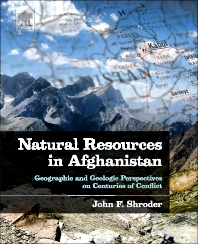 This article was originally published online by Geoscientist, the independent fellowship magazine of the Geological Society of London.
This article was originally published online by Geoscientist, the independent fellowship magazine of the Geological Society of London.
Afghanistan has been in the news for as long as I can remember, normally as a place of conflict and almost never as a place of diverse landscapes, resources and culture. In 2011, however, I was invited to join a workshop in Leicester on higher education in Afghanistan, meeting a number of geoscience academics from Kabul and beyond. Since then I’ve been fascinated by the potential role of geoscience in supporting sustainable development in this region of the world. Shroder’s book serves to highlight this exciting potential, helping the reader understand both the relevant science and cultural complexities.
Through 21 chapters, this volume presents an overview of the geology and geography of Afghanistan, exploring natural resources as both a problem and solution, and discussing the relationship between environment and development. The final two chapters offer a poignant reminder that there exist both pessimistic and optimistic outlooks about the future of Afghanistan. Overall it covers an impressive range of topics, including geological structures, gemstones, water, soils, geomorphology, hazards and much more.
Interactions between geology and human geography are important, but commonly overlooked in country-specific geoscience texts. Shroder’s textbook on the natural resources of Afghanistan successfully integrates history, culture, politics and geology to give a balanced, informative and holistic understanding of a remarkable nation. The book is also very well illustrated, although a tendency to print small sub-page sized maps meant legends were sometimes too small to read and use properly. The integration of context, together with many helpful figures and tables, means this book should appeal to a broad audience. The research geologist, industry professional, government official, not-for-profit and intergovernmental organisation should all find it to be generally accessible, engaging and informative.
In assessing potential users of this book, one must reflect on the many that may not have the proficiency in English to fully utilise this volume. I hope that a government or intergovernmental organisation sees fit to commission one or more translations into appropriate national languages. Such an endeavour could serve Afghani geoscience students, and other local and national government officials very well, strengthening work towards a more optimistic future.
As researchers and practitioners of applied geoscience, investing in understanding ‘place’ can only enhance our work. Shroder’s holistic integration of geology with a broader geographical and historical narrative demonstrates how this can be done well. More books using this approach would be a welcome addition to the body of geoscience literature in existence.
Reviewed by Joel C. Gill
NATURAL RESOURCES IN AFGHANISTAN: GEOGRAPHIC AND GEOLOGIC PERSPECTIVES ON CENTURIES OF CONFLICT by JOHN F. SHRODER, 2014. Published by Elsevier Inc. 572pp (hbk) ISBN 978-01280013356 List price: £125.00. W: www.store.elsevier.com/Natural-Resources-in-Afghanistan/John-Shroder/isbn-9780128001356/
(You can also look out for it/request it in your university library)
